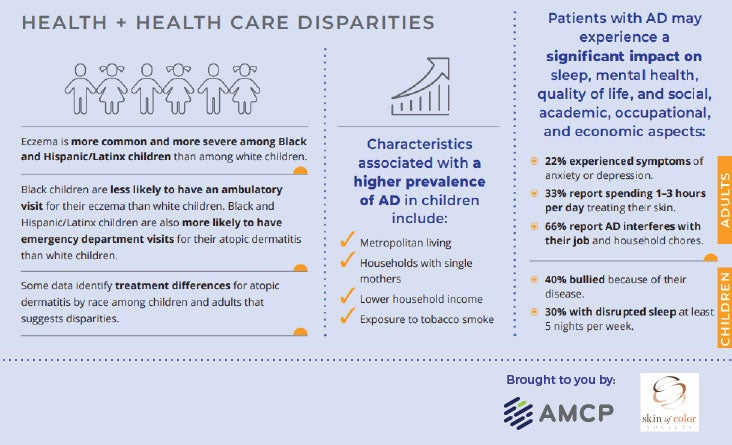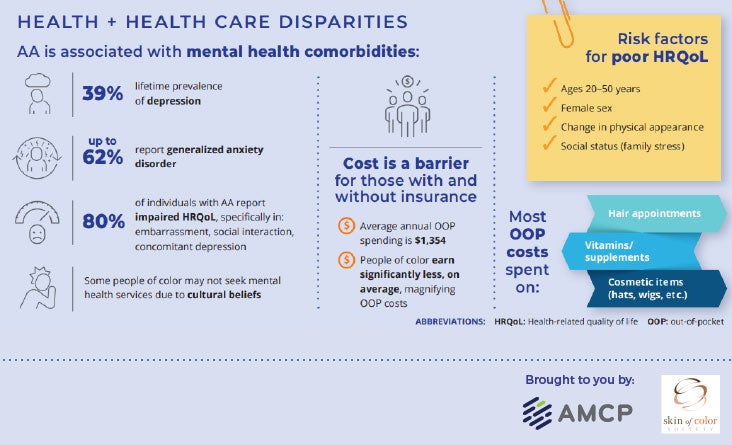
Culturally Mindful Approaches in Dermatology: Bridging Gaps in Care for Immune-Mediated Skin Conditions

As managed care and pharmacy professionals, our commitment extends beyond medications; it encompasses understanding the diverse needs of the populations we serve. In the realm of dermatology, where skin health can be impacted by cultural distinctions and health disparities, it becomes imperative to adopt culturally mindful care approaches. AMCP was honored to partner with The Skin of Color Society to develop two invaluable resources focusing on immune-mediated skin conditions — atopic dermatitis (AD) and alopecia areata (AA) — within the context of skin of color, social determinants of health (SDOH), and health disparities.

Multiple skin conditions – including atopic dermatitis and alopecia areata – are caused and/or driven by the immune system as a result of genetic susceptibility, environmental triggers, and autoimmunity activation. Complex immunological pathways drive disease onset and progression and contribute to higher disease severity, debilitating comorbidities, and costly complications. In recent years, the development and introduction of novel targeted therapies that inhibit cytokines within these pathways offer patients with moderate to severe disease additional opportunities to achieve/maintain disease control and improve patient outcomes. Considering the rapidly growing therapeutic options and pipeline, managed care and other pharmacy professionals need increased awareness and education on these therapies (as well as evidence-based, patient-centered, and risk-management considerations) to ensure that the right patient has access to the right therapy at the right time.
Navigating Health Disparities
Skin conditions can manifest differently across racial, ethnic, and socioeconomic populations. For instance, Black and Latinx individuals with atopic dermatitis have higher rates of ambulatory and emergency department visits, possibly due to lower detection or recognition of the condition in darker skin tones or decreased access to specialist care. Similarly, alopecia areata may exhibit higher prevalence rates among Black and Hispanic/Latinx populations. The underlying reasons for these disparities remain multifaceted, and the role genetics, biology, and social or environmental factors play in these observed differences is unclear.
To address the ongoing need for increased awareness and sensitivity, managed care and pharmacy professionals must equip themselves with culturally competent resources. One such avenue is through a continuing education series, “Innovations in Immune-Mediated Skin Conditions,” focusing on atopic dermatitis and alopecia areata, accompanied by culturally mindful documents. These resources delve into the impact of these conditions among diverse populations, shedding light on the factors related to race, ethnicity, and health outcomes.

Advocating for Health Equity
AMCP stands for actions to support equity and inclusion within the profession. Advocating for measures to eliminate inequities stemming from racism and discrimination, AMCP underscores the importance of health equity in marginalized communities. By addressing disproportionate health outcomes and championing initiatives, like the resources mentioned, that promote learning and useful tips for increased awareness for managed care and pharmacy professionals to incorporate into practice.
Looking Ahead
Take a moment to explore unique aspects of immune-mediated skin conditions related to skin of color, download a useful reference document, and engage further by participating in the on-demand educational series — Focus on Atopic Dermatitis or Focus on Alopecia Areata — featuring expert dermatologists and a managed care pharmacy perspective. By leveraging resources that acknowledge what is currently known about skin of color, SDOH, and health disparities, we can bridge gaps, enhance awareness, and foster equitable outcomes for all individuals. Together, let us uphold the values of inclusivity and equity for all skin types, ensuring that every patient receives the care and respect they deserve, regardless of race, ethnicity, or background.

Jennifer Evans
PharmD Director, Education Programs/Grants
Published on June 10, 2024
Featured News & Resources
See Full CalendarAward Applications Open
AMCP eLearning Day: Nexus Encore
AMCP 2026 Registration Opens
Upcoming Events
AMCP offers a wide variety of educational opportunities, from events and webinars to online training.







